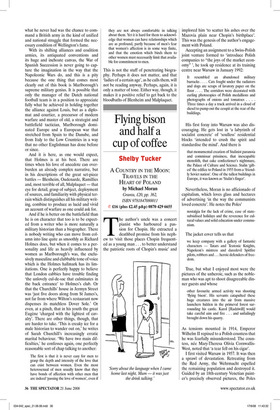Flying bison and half a cup of coffee
Shelby Tucker
A COUNTRY IN THE MOON: TRAVELS IN THE HEART OF POLAND by Michael Moran Granta, £20, pp. 362, ISBN 9781847080011 ✆ £16 (plus £2.45 p&p) 0870 429 6655 The author’s uncle was a concert pianist who harboured a passion for Chopin. He extracted a deathbed promise from his nephew to ‘visit those places Chopin frequented as a young man . . . to better understand the patriotic roots of Chopin’s music’ and implored him ‘to scatter his ashes over the Mazovia plain near Chopin’s birthplace’. This was the genesis of the author’s engagement with Poland.
Accepting an assignment to a Swiss-Polish joint venture formed to ‘introduce Polish companies to “the joys of the market economy” ’, he took up residence at its training centre near Warsaw in January 1992:
It resembled an abandoned military barracks . . . . Cats fought under the radiators and dogs ate scraps of lavatory paper on the floor . . . . The corridors were decorated with curling photocopies of Polish medallions and photographs of onions and tomatoes . . . . Three times a day a truck arrived in a cloud of diesel to pump out the cesspit at the rear of the buildings.
His first foray into Warsaw was also discouraging. He gets lost in ‘a labyrinth of socialist concrete’ of ‘soulless’ residential blocks ‘intended to crush the spirit and standardise the mind’. And there is
that monumental creation of Stalinist paranoia and commissar prissiness, that inescapable monolith, that cake confectioner’s nightmare, the Palace of Culture and Science. Stalin ‘gifted’ the edifice to Poland in 1955 from a ‘friendly Soviet nation’. One of the tallest buildings in Europe, it was known as ‘Stalin’s finger’.
Nevertheless, Moran is no afficionado of capitalism, which loves glass and hectares of advertising ‘in the way the communists loved concrete’. He notes the Poles’
nostalgia for the lack of crime, ease of statesubsidised holidays and the reverence for cultural values and solid education under communism.
The jacket cover tells us that
we keep company with a gallery of fantastic characters — Tatars and Teutonic Knights, Napoleon’s mistress and daredevil Spitfire pilots, robbers and . . . heroic defenders of freedom.
True, but what I enjoyed most were the pictures of the unheroic, such as the nobleman who was apt to shoot disagreeable dinner guests and whose
other favourite armed activity was shooting ‘flying bison’. His servants catapulted these huge creatures into the air from massive launchers hidden in the primeval forest surrounding his castle. Karol [Radziwill] would take careful aim and fire . . . and unfailingly brought down his quarry.
As tensions mounted in 1914, Emperor Wilhelm II repined to a Polish countess that he was fearfully misunderstood. The countess, née Mary-Theresa Olivia CornwallisWest, noted that ‘a tear fell on his cigar’.
I first visited Warsaw in 1957. It was then a sprawl of devastation. Retreating from the Red Army, the Wehrmacht expelled the remaining population and destroyed it. Guided by an 18th-century Venetian painter’s precisely observed pictures, the Poles cleared the rubble and restored it, and the beautiful city that I found on returning there in 1988 is now a Unesco World Heritage site. Moran entitles the chapter concerning this remarkable resurrection ‘Warsaw the Phoenix’.
There is so much to admire in this wellresearched and hugely entertaining book, and so much to learn. Certainly, I did not know that Poles regard their country as ‘the reincarnation of the suffering Christ’. That Schumann described Chopin’s music as ‘cannons hidden among flowers’. That the national composer of Poland left Poland at the age of 20, never to return. That Polish aristocrats once claimed descent from nomadic archers of Iranian stock related to the Scythians. That under communism, Poles could buy half a cup of coffee if they were too poor to afford a full cup. That many Poles hold that entry into the European Union was ‘the onset of moral decay’.
I have some criticisms. There is too much about the ‘Holocaust’, yet nothing new except the Polish spelling of Auschwitz. Moran’s handling of dialogue is sometimes a little clumsy, a curious shortcoming in such a talented writer. That said, if you fancy elegant erudition, A Country in the Moon is a three-star feast.











































































 Previous page
Previous page